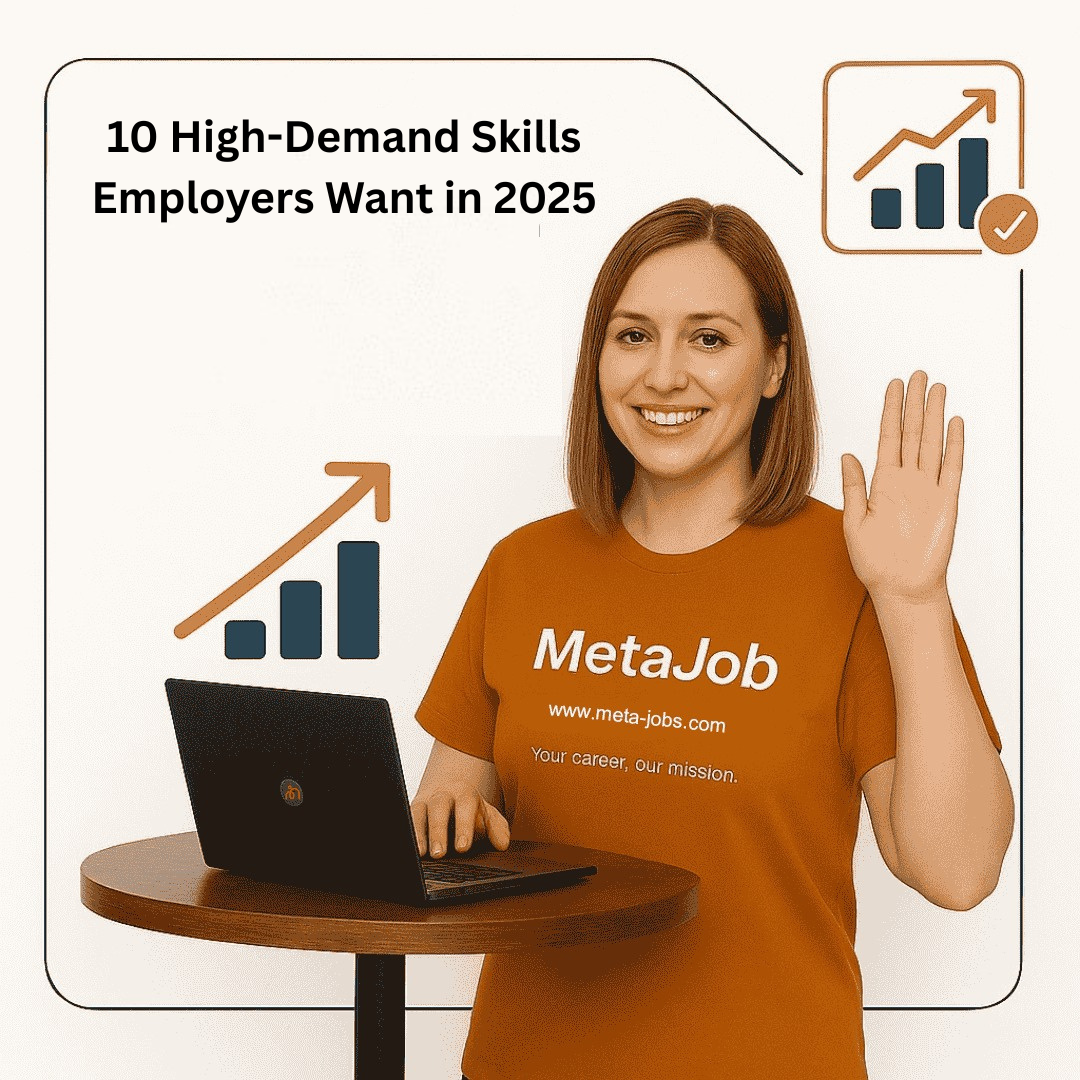
Discover the top 10 skills employers want in 2025, including data analysis, AI tools, communication, teamwork, adaptability, and critical thinking.

As the job market continues to evolve, staying ahead means mastering the skills employers value most. In 2025, technology, collaboration, and adaptability will define career success. Whether you are entering the workforce or planning a career shift, knowing which skills are in demand will help you stand out and secure your dream role.
In this article, we’ll explore 10 high-demand skills that employers are looking for in 2025, including both technical and soft skills.
The ability to interpret, analyze, and make decisions based on data is no longer optional. Companies rely on data to improve efficiency, customer experience, and strategic planning.
Why it’s important:
Data-driven decisions lead to better outcomes.
Employers seek candidates who can use tools like Excel, Tableau, Power BI, Python, and SQL.
Understanding metrics, KPIs, and trends helps organizations adapt quickly.
Tips to develop this skill:
Take online courses in data visualization and statistics.
Practice analyzing datasets on platforms like Kaggle.
Include measurable outcomes from past projects on your resume.
Artificial Intelligence (AI) and automation are transforming workplaces across industries. Employers want staff who can leverage these tools to improve efficiency.
Key areas to focus on:
AI-powered analytics (e.g., IBM Watson, Google AI)
Robotic Process Automation (RPA)
Machine learning basics for non-technical roles
AI-driven marketing and customer support tools
Benefits:
Increase productivity by automating repetitive tasks.
Reduce errors in data processing and operations.
Enhance decision-making with predictive insights.
Strong communication skills remain essential. Clear, concise communication helps teams collaborate effectively and ensures business objectives are met.
Why it’s critical in 2025:
Remote and hybrid work models rely heavily on written and verbal communication.
Employers value the ability to convey ideas clearly to colleagues, clients, and stakeholders.
Strong communication reduces misunderstandings and improves project outcomes.
How to improve:
Practice public speaking and presentations.
Learn to write clear emails, reports, and proposals.
Engage in active listening and feedback sessions.
Employers prioritize candidates who can work well in teams, especially as many projects are cross-functional. Collaboration skills are increasingly digital.
Key skills for teamwork:
Conflict resolution and negotiation
Collaboration tools like Slack, Trello, Asana
Building trust and accountability
Supporting diversity and inclusion initiatives
Tip: Highlight team projects and measurable contributions in your resume.
The workplace is changing faster than ever. Employees who can adapt to new situations and think critically are invaluable.
Why it matters:
New technologies, market shifts, and global challenges require flexible problem-solving.
Critical thinking allows you to evaluate options and make informed decisions.
How to develop:
Take on projects outside your comfort zone.
Practice scenario-based problem solving.
Stay updated on industry trends and innovations.
EQ is the ability to understand your own emotions and those of others. It’s increasingly recognized as a key leadership and collaboration skill.
Benefits:
Enhances team dynamics and conflict management.
Helps build strong relationships with colleagues and clients.
Supports mental health awareness and empathy in the workplace.
Ways to improve:
Reflect on your responses to challenges and feedback.
Practice active listening and empathy exercises.
Learn to manage stress and maintain emotional balance.
From social media marketing to remote collaboration, digital literacy is essential.
Skills to focus on:
Using cloud platforms (e.g., Google Workspace, Microsoft 365)
Basic coding and web literacy
Cybersecurity awareness
Online research and information evaluation
Tip: Employers value employees who can quickly learn and adapt to new digital tools.
Project management ensures initiatives are completed on time, within scope, and on budget.
Key skills for project management:
Agile and Scrum methodologies
Time management and task prioritization
Risk assessment and mitigation
Resource allocation
Recommended tools: Jira, Asana, Monday.com, Trello
Tip: Even if not in a managerial role, demonstrating project management skills increases your marketability.
Employers need individuals who can think outside the box to solve problems and improve processes.
Applications in 2025:
Developing new products or services
Enhancing customer experiences
Innovating marketing strategies
Process improvements and automation solutions
How to develop:
Brainstorm regularly and challenge assumptions.
Participate in cross-functional projects.
Take creative courses in design thinking or problem-solving.
Globalization and remote work increase the value of employees who understand diverse cultures and speak multiple languages.
Benefits:
Expands your ability to work with international teams.
Improves customer relations and market insights.
Enhances adaptability in multicultural environments.
Tips:
Learn a second language using apps like Duolingo or Babbel.
Engage in cross-cultural communication experiences.
Highlight language skills and international projects on your resume.
Online Courses: Platforms like Coursera, Udemy, LinkedIn Learning.
Certifications: For example, Google Analytics, Tableau, Agile, or PMP.
Practical Experience: Apply skills through internships, projects, or volunteering.
Networking: Join professional communities to learn emerging trends.
Continuous Learning: Read industry blogs, attend webinars, and participate in workshops.
In 2025, employers are looking for a balance of technical expertise, digital proficiency, and soft skills. Mastering data analysis, AI tools, communication, teamwork, adaptability, and emotional intelligence will make you a highly desirable candidate. By focusing on these high-demand skills, you’ll future-proof your career and increase your opportunities in a competitive job market.
Platforms like MetaJobs can help you showcase these skills, connect with top employers, and access resources to strengthen your profile.